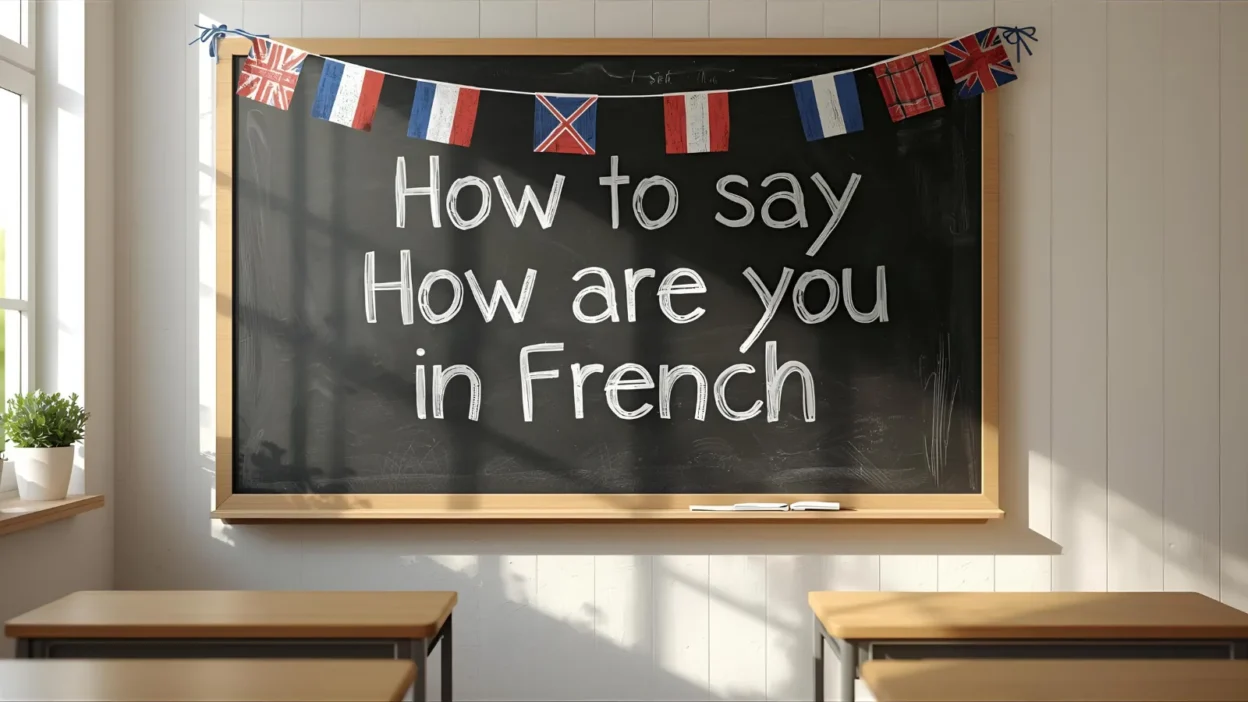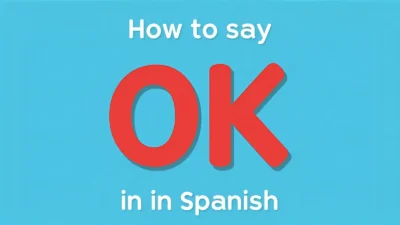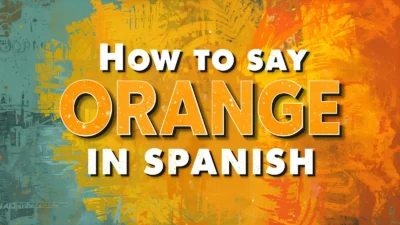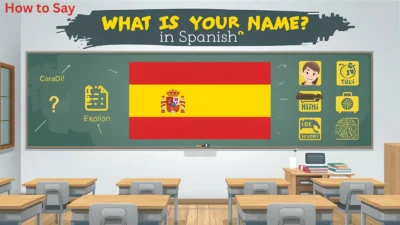Learning how to say how are you in French is one of the first steps to starting friendly conversations. The most common phrase is comment ça va ?, but there are also formal and casual variations depending on who you’re speaking to.
Mastering these greetings helps you sound polite, approachable, and confident when talking to French speakers. They also allow you to connect more deeply by showing genuine interest in someone’s well-being. With practice, you’ll know exactly how to respond naturally in different situations.
How Are You in French
15 Ways to Say How Are You in French
| No. | French Phrase | English Meaning | Usage / Context |
|---|---|---|---|
| 1 | Comment ça va ? | How’s it going? | Common, casual |
| 2 | Ça va ? | You good? / Okay? | Informal, short |
| 3 | Comment allez-vous ? | How are you? | Formal / polite |
| 4 | Comment vas-tu ? | How are you? | Semi-formal, friendly |
| 5 | Tu vas bien ? | Are you doing well? | Informal, caring |
| 6 | Vous allez bien ? | Are you doing well? | Formal / polite |
| 7 | Ça roule ? | Things rolling? / All good? | Very casual, slang |
| 8 | Quoi de neuf ? | What’s new? | Informal, friendly |
| 9 | Ça gaze ? | How’s it going? (slang) | Casual, youthful |
| 10 | Tout va bien ? | Everything good? | Neutral, caring |
| 11 | Comment tu te sens ? | How do you feel? | Personal, empathetic |
| 12 | Ça se passe ? | How’s it going? | Casual, informal |
| 13 | Comment ça se passe ? | How’s it going? (situation) | Everyday context |
| 14 | Ça marche ? | All good? / Okay? | Casual, friendly |
| 15 | Comment va ta journée ? | How’s your day going? | Caring, everyday |
explore 15 authentic and commonly used ways to say How are you? in French, complete with sample dialogues and context for when to use each.
1. Comment ça va ?

(How’s it going?)
Origin:
This is the most commonly taught and widely used informal way to ask someone how they are. It literally means “How is it going?”
Example:
👤 User A: Salut, comment ça va ?
👤 User B: Ça va bien, merci ! Et toi ?
Use: Informal; used with friends, peers, or in casual settings.
2. Ça va ?
(All good?)
Origin:
A shortened version of comment ça va, used just like “You good?” in English.
Example:
👤 User A: Hé, ça va ?
👤 User B: Ouais, tranquille !
Use: Very casual; common among close friends or young people.
3. Comment allez-vous ?

(How are you? — formal)
Origin:
This is the polite or formal version of “How are you?” in French. It’s often used in professional or respectful situations.
Example:
👤 User A: Bonjour Madame, comment allez-vous ?
👤 User B: Très bien, merci. Et vous ?
Use: Formal situations, speaking to elders or strangers.
4. Tu vas bien ?
(Are you doing well?)
Origin:
Literally translates to “You are doing well?” and is used in friendly contexts.
Example:
👤 User A: Tu vas bien aujourd’hui ?
👤 User B: Oui, super bien. Merci !
Use: Informal, friendly.
5. Vous allez bien ?
(Are you well? — formal)
Origin:
Same structure as “tu vas bien” but in the polite vous form.
Example:
👤 User A: Bonjour Monsieur, vous allez bien ?
👤 User B: Oui, tout va bien, merci beaucoup.
Use: Formal version of #4; use it in respectful or professional settings.
6. Quoi de neuf ?

(What’s new?)
Origin:
This is equivalent to the English “What’s new?” and is very common in France among young people.
Example:
👤 User A: Salut, quoi de neuf ?
👤 User B: Pas grand-chose. Et toi ?
Use: Informal; used with friends.
7. Ça roule ?
(Things rolling?)
Origin:
Literally means “Is it rolling?”—a casual slang expression similar to “Everything good?”
Example:
👤 User A: Yo, ça roule ?
👤 User B: Comme d’hab’ !
Use: Informal, slangy, very French.
8. Ça gaze ?
(Is it gassing?)
Origin:
Old French slang from the 20th century. It means something like “Is everything bubbling along nicely?”
Example:
👤 User A: Salut, ça gaze ?
👤 User B: Tranquille, et toi ?
Use: Youth slang; humorous or playful tone.
9. Ça baigne ?
(Is it bathing?)
Origin:
This expression means “Is it soaking/bathing?” and implies things are smooth or relaxed.
Example:
👤 User A: Hé, ça baigne ?
👤 User B: Ouais, tout roule.
Use: Casual, relaxed, very colloquial.
10. Comment tu te sens ?
(How do you feel?)
Origin:
Used when genuinely asking about someone’s emotional or physical state.
Example:
👤 User A: Tu avais l’air fatigué hier. Comment tu te sens ?
👤 User B: Un peu mieux, merci.
Use: Friendly and caring tone; use with someone you know well.
11. Comment vous vous sentez ?
(How do you feel? — formal)
Origin:
The polite version of #10. It’s used for serious inquiries or formal situations.
Example:
👤 User A: Après votre opération, comment vous vous sentez ?
👤 User B: Fatigué, mais soulagé.
Use: Formal or medical contexts.
12. Ça marche ?
(Is it working?)
Origin:
Literally “Is it walking/working?”, this is often used as a check-in.
Example:
👤 User A: Salut ! Le nouveau boulot, ça marche ?
👤 User B: Oui, pas mal du tout !
Use: Semi-informal; used in daily conversation.
13. Tout va bien ?
(Everything going well?)
Origin:
A caring question that means “Is everything okay?” or “All good?”
Example:
👤 User A: Tout va bien à la maison ?
👤 User B: Oui, on gère. Merci !
Use: Informal to semi-formal; can be used sincerely or politely.
14. Comment vas-tu ?
(How are you? — slightly formal)
Origin:
A more grammatically formal version of “tu vas bien”, often taught in schools.
Example:
👤 User A: Bonjour Marie, comment vas-tu ?
👤 User B: Je vais bien, et toi ?
Use: Polite but not overly formal.
15. Ça va la forme ?
(You doing okay? Feeling strong?)
Origin:
“Forme” means physical shape or form. This phrase is like asking “Feeling fit and energized?”
Example:
👤 User A: Salut ! Ça va la forme ?
👤 User B: Oh oui, la pêche aujourd’hui !
Use: Informal and friendly; sometimes used by gym trainers or sporty people.
FAQs
1. What is the most common way to say “How are you?” in French?
The most common phrase is “Comment ça va ?”, which means “How’s it going?”
2. How do you pronounce “Comment ça va ?”
It’s pronounced koh-mahn sah vah.
3. Is “Comment ça va ?” formal or informal?
It’s informal and used with friends, family, or people your age.
4. How do you ask “How are you?” politely in French?
You can say “Comment allez-vous ?” — it’s formal and respectful, perfect for strangers or elders.
5. What’s a more casual way to ask “How are you?”
You can simply say “Ça va ?” which means “You good?” or “Everything okay?”
6. How do you answer “Comment ça va ?”
You can reply with “Ça va bien” (I’m fine), “Pas mal” (Not bad), or “Ça ne va pas” (I’m not okay).
7. Can I just say “Ça va” as both the question and answer?
Yes! In French, “Ça va ?” means “How are you?” and “Ça va” means “I’m fine.”
8. How do you say “How are you today?” in French?
You say “Comment ça va aujourd’hui ?” — oh-zhoor-dwee means “today.”
9. What’s the difference between “Comment ça va ?” and “Comment allez-vous ?”
“Comment ça va ?” is informal, while “Comment allez-vous ?” is formal and polite.
10. How do you ask “How are you?” to a friend in text or chat?
You can write “Ça va ? 😊” — it’s short, friendly, and perfect for casual messages.
Conclusion:
Mastering how to say how are you in French helps you start conversations with confidence and respect. From casual ça va ? with friends to formal comment allez-vous ? with strangers or colleagues, these phrases let you adapt naturally to different social settings. By practicing them, you’ll not only improve your language skills but also build stronger connections with French speakers.



